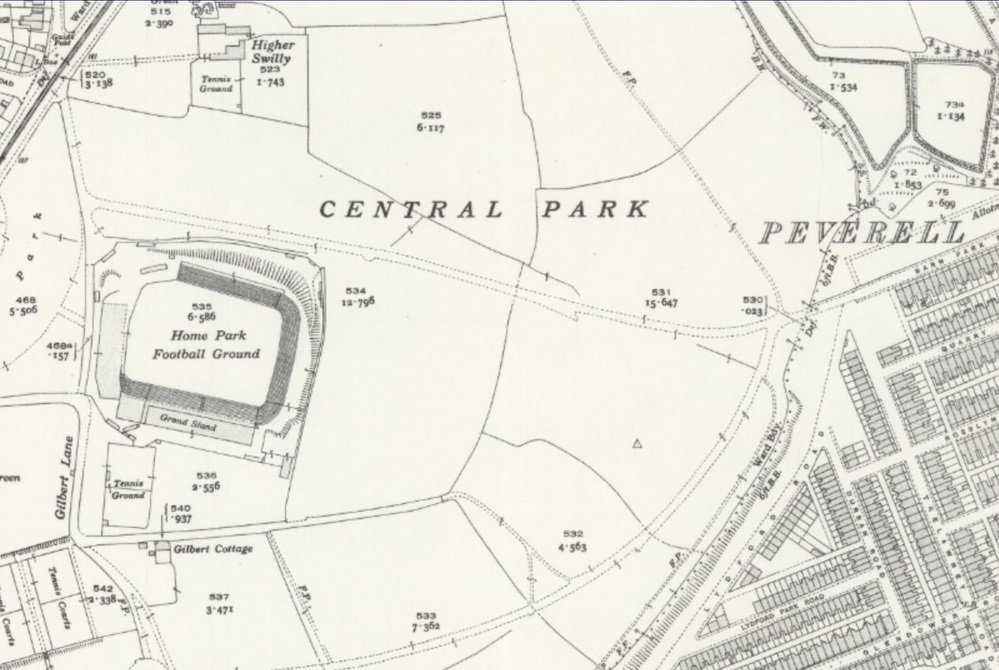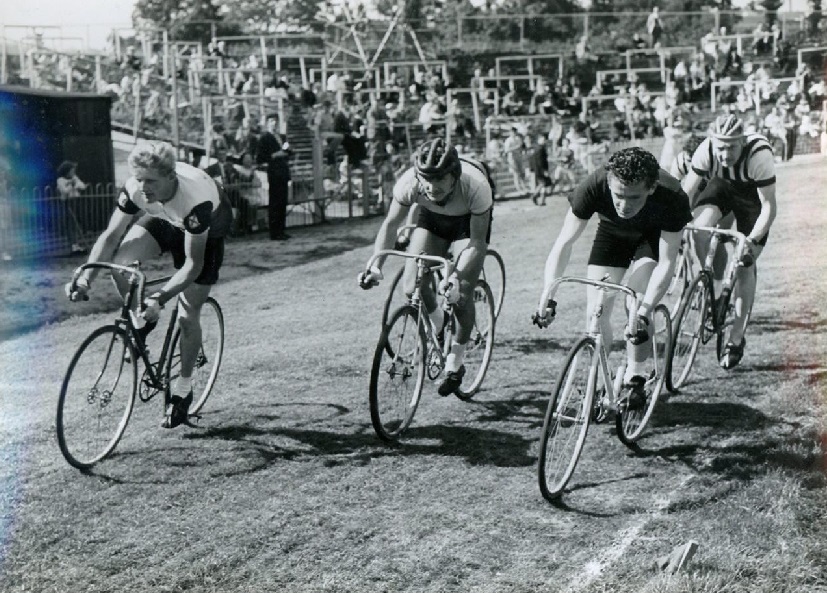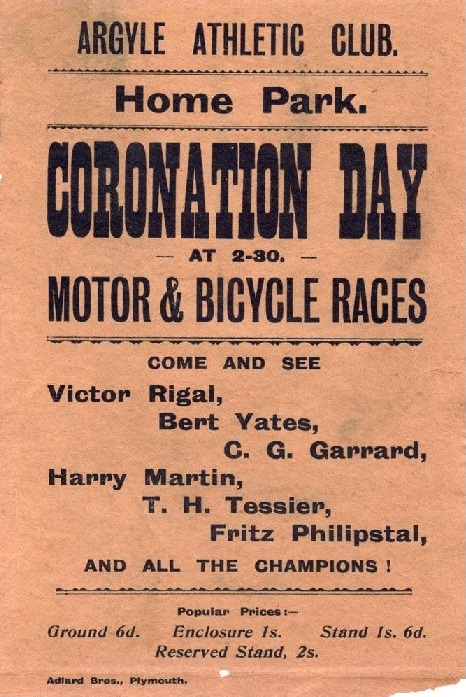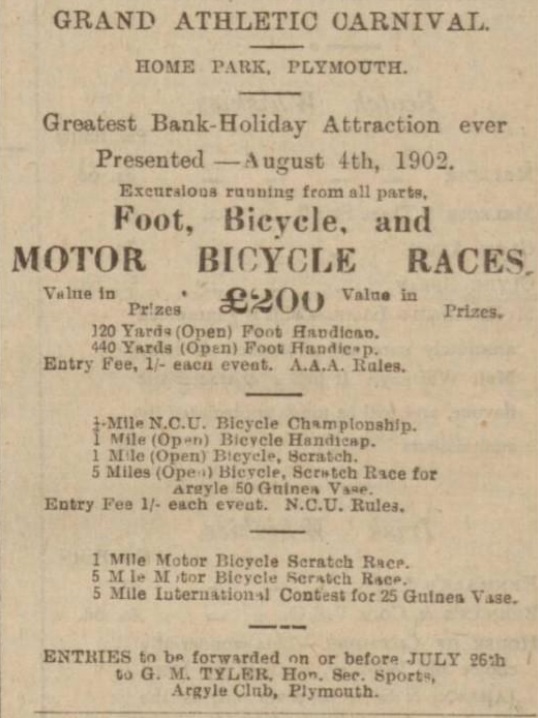


A new company called Home Park Recreation Ground Limited was set up in 1893, to run the track. When the new track opened, there was one main cycling club in the city, this was Plymouth Cycling Club which was formed in 1877 as Plymouth Bicycle Club and subsequently changed their name in 1884. The first bicycle race meeting at Home Park was on Whit Monday May 22nd 1893, when Plymouth CC held a meeting billed as the ‘Grand opening of the new bicycle track'.
Plymouth CC had a history of holding a bicycle race meeting on Whit Mondays, this started with meetings at the Ragland Barracks in the 1890s and continued through to the 1902. Their 100 guinea Challenge Cup was competed for twice yearly, at the Whit Monday meetings and at their annual August Bank holiday meeting, the Cup could be won outright with three victories.
The opening meeting of the new track on Whit Monday 1893 was an impressive affair, with 8,000 spectators. The bicycle races were a one mile local handicap, one mile 2nd class handicap, half and one mile open handicaps, half and one mile scratch. The chief event was the 100 guinea Challenge Cup and A Du Cros, the Irish champion, was heavily fancied, having won the cup for the previous two years, but he was unexpectedly well beaten by L Stroud of London BC.
1893 was an incredibly busy year at Home Park. The annual Albion athletic sports were held on 28th June at which there were six bicycle races and the three miles scratch event for the Albion Challenge Bowl, value 26 guineas, was won by N Craig of Albion CC in 8m 32s. Plymouth CC held their race meeting on Monday 7th August 1893 in front of 5,000 spectators. The main event was five miles race Challenge Cup race, which produced a thrilling three-up sprint finish between the current Cup holder, L Stroud of London BC, J Rowley Stanley BC and TW Good of Catford CC, with Stroud winning by a wheel. Plymouth CC also mid-week meetings during the summer, this attracted a lot of good riders including regulars from London clubs. In its first year of operation, Home Park Recreation Ground Limited made a good profit, paying shareholders 5% and placing half of its profit in their reserve fund.
The Whit Monday and August Bank Holiday meetings run by Plymouth CC were well established and in 1894, a new local cycling club called Three Towns Wheelers was formed. In the first year of Three Towns existence, they held a bicycle race meeting on 29th August, putting on a first class meeting with top riders including T Osborne, HW Payne, N Craig, L Stroud and J Platt-Betts competing. The main event was a three miles challenge race, which for the first time in the South West, was paced by tandems.
At the Plymouth CC Whit Monday meeting on 3rd June 1895 meeting, there were 10,000 spectators. There were eleven starters for the Challenge Cup, including the Irish man Du Cros++ who was not licenced by the NCU, Du Cros took off his number and started after the main field as a protest. The pace was kept high as a lap prize was offered and at the end of a great race, AJ Watson won the sprint from F.A. May. The lap prize was won by RF Davis, who would become a director of Argyle and a Rudge-Whitworth cycle dealer in the town. There was lots more racing at Home Park in 1895, at the August Bank Holiday meeting, AJ Watson won the Cup again. Three Towns Wheelers had a meeting on 28th August 1895 at which the great Frank Shorland appeared. Albion FC, the Royal Berkshire Regiment and Devonport CC held bicycle races.
Clarence Spooner**, who was the president of newly formed Argyle Athletic Club, obtained a lease on the ground in 1897. Spooner was ambitious about sports in Plymouth and he promoted football, rugby, running, bicycle racing, whippet racing and motorcycle racing at the ground. Spooner's Argyle had its own social club on Old Town Street and was an umbrella for many sports clubs including Argyle Athletics, Football, Cricket and Rugby Clubs. Spooner's take over resulted in very few bicycle races being held for a few years.
In 1901 bicycle racing resumed when Argyle Athletic Club held their sports on Whit Monday 1901 with an attendance of 6,000. Argyle had recently re-laid the track, the bankings were increased and the track was widened in the back and home straights. At the meeting, WR Matthews of Whitworth CC won the NCU Devon and Cornwall one mile championship. NCU local championship races were now fairly frequently held at Home Park and the Argyle 50 guinea Vase was competed for at their events.
In 1902, motor cycle races were introduced at the ground. In 1903, Argyle FC changed their name to Plymouth Argyle FC and started to play at Home Park. Plymouth CC held their Whit Monday sports on 1903, they had an ambitious program, which the club carried off successfully. The five miles race for the 100 guinea Challenge Cup was won by HE Wills of Putney CC who beat the local hero A Kitto of Whitworth CC by half a wheel.
The Challenge Cup race in 1905 was again won by local man A Kitto and was watched by 7,000 people. The one mile NCU championship was not decided after the competitors crawled and exceeded the time limit++. At the meeting, there was a devil take the hindmost event, a new type of race at that time, and this was described by the press as ‘a very amusing race'
There was, for some reason, a break in bicycle race meetings until 1922, when Devonport Royal Dockyard held their sports and bicycle races figured prominently. Both the half and five miles NCU Devon and Cornwall Championship races were won by FR Boon of Plymouth Corinthian CC. Bicycle racing at Home Park continued through the 1920s, although much less frequently.
The NCU Devon and Cornwall 5 miles championship was held there in 1926, with 6,000 spectators and the following year saw the two miles local NCU team pursuit championship. The last bicycle racing at Home Park was in 1930 at the Devonport YMCA sports meeting.
The banked cycle track was removed in 1930, the banking had already been ruined due to crowd barriers being installed on it, the banking was used as terracing. The charge for using Home Park for event was raised to £21 in 1937, which was severely criticised by cycling organisations.
Home Park is now part of the Plymouth Central Park area and cycle races were held in Central Park in the late 1940s and 1950s. The events were road races which were held on a circuit through the park, approximately a mile in length. Home Park is still the home ground of Plymouth Argyle who play in the football league. The stadium has also hosted rugby games and live music concerts featuring Rod Stewart, George Michael and Elton John.
** Clarence Newby Spooner was the senior partner of Spooner's department store on Old Town Street. Spooner was rich and ambitious, with plans for a variety of sporting ventures in Plymouth.
++ Competitors crawling along for most of a race, then contesting the sprint at the end was endemic around the 1890s. It really annoyed the crowd and contributed in some way to the sport losing its popularity. Organisers tried to stop this practice by having a time limit for a race, or by giving lap prizes.

